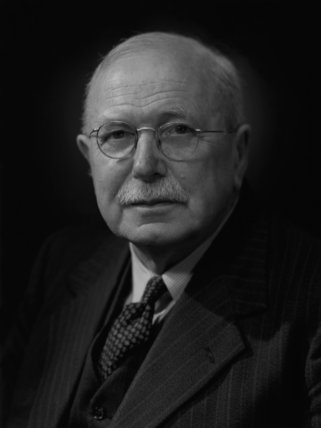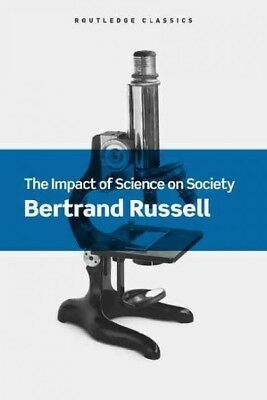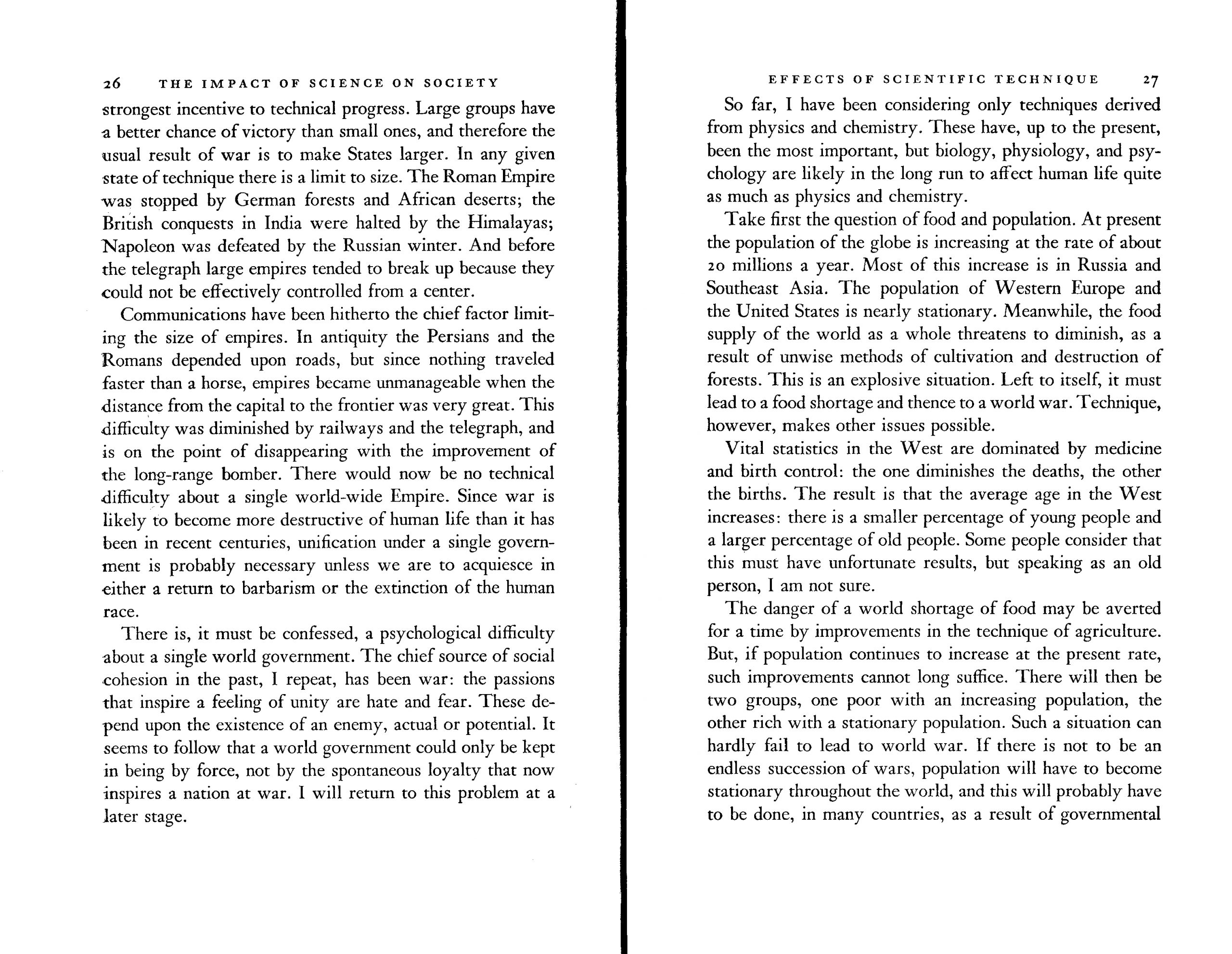Excerpt from the book (see especially p.27 et seq.)
From the original edition of 1953
The Impact of Science on Society – Bertrand Russell
Take first the question of food and population. At present the population of the globe is increasing at the rate of about 20 millions a year. Most of this increase is in Russia and Southeast Asia. The population of Western Europe and the United States is nearly stationary. Meanwhile, the food supply of the world as a whole threatens to diminish, as a result of unwise methods of cultivation and destruction of forests. This is an explosive situation. Left to itself, it must lead to a food shortage and thence to a world war. Technique, however, makes other issues possible. Vital statistics in the West are dominated by medicine and birth control: the one diminishes the deaths, the other the births. The result is that the average age in the West increases: there is a smaller percentage of young people and a larger percentage of old people. Some people consider that this must have unfortunate results, but speaking as an old person, I am not sure. The danger of a world shortage of food may be averted for a time by improvements in the technique of agriculture. But, if population continues to increase at the present rate, such improvements cannot long suffice. There will then be two groups, one poor with an increasing population, the other rich with a stationary population. Such a situation can hardly fail to lead to world war. If there is not to be an endless succession of wars, population will have to become stationary throughout the world, and this will probably have to be done, in many countries, as a result of governmental measures. This will require an extension of scientific tech- nique into very intimate matters. There are, however, two other possibilities. War may become so destructive that, at any rate for a time, there is no danger of overpopulation; or the scientific nations may be defeated and anarchy may de- stroy scientific technique. Biology is likely to affect human life through the study of heredity. Without science, men have changed domestic animals and food plants enormously in advantageous ways. It may be assumed that they will change them much more, and much more quickly, by bringing the science of genetics to bear. Perhaps, even, it may become possible artificially to induce desirable mutations in genes. (Hitherto the only muta- tions that can be artificially caused are neutral or harmful.) In any case, it is pretty certain that scientific technique will very soon effect great improvements in the animals and plants that are useful to man. When such methods of modifying the congenital character of animals and plants have been pursued long enough to make their success obvious, it is probable that there will be a powerful movement for applying scientific methods to human propagation. There would at first be strong religious and emotional obstacles to the adoption of such a policy. But sup- pose (say) Russia were able to overcome these obstacles and to breed a race stronger, more intelligent, and more resistant to disease than any race of men that has hitherto existed, and suppose the other nations perceived that unless they followed suit they would be defeated in war, then either the other nations would voluntarily forgo their prejudices, or, after defeat, they would be compelled to forgo them. Any scientific technique, however beastly, is bound to spread if it is useful in war— until such time as men decide that they have had enough of war and will henceforth live in peace. As that day does not seem to be at hand, scientific breeding of human beings must be expected to come about. I shall return to this subject in a later chapter. Physiology and psychology afford fields for scientific tech- nique which still await development. Two great men, Pavlov and Freud, have laid the foundation. I do not accept the view that they are in any essential conflict, but what structure will be built on their foundations is still in doubt. I think the subject which will be of most importance polit- ically is mass psychology. Mass psychology is, scientifically speaking, not a very advanced study, and so far its professors have not been in universities: they have been advertisers, politicians, and, above all, dictators. This study is immensely useful to practical men, whether they wish to become rich or to acquire the government. It is, of course, as a science, founded upon individual psychology, but hitherto it has employed rule-of-thumb methods which were based upon a kind of intuitive common sense. Its importance has been enormously increased by the growth of modern methods of propaganda. Of these the most influential is what is called "education." Religion plays a part, though a diminishing one; the press, the cinema, and the radio play an increasing part. What is essential in mass psychology is the art of per- suasion. If you compare a speech of Hitler's with a speech of (say) Edmund Burke, you will see what strides have been made in the art since the eighteenth century. What went wrong formerly was that people had read in books that man is a rational animal, and framed their arguments on this hypothesis. We now know that limelight and a brass band do more to persuade than can be done by the most elegant train of syllogisms. It may be hoped that in time anybody will be able to persuade anybody of anything if he can catch the patient young and is provided by the State with money and equipment.

The next million years by Charles Galton Darwin
Sir Charles Galton Darwin, KBE, MC, FRS was an English physicist who served as director of the National Physical Laboratory during the Second World War. He was the son of the mathematician George Howard Darwin and a grandson of Charles Darwin. More at Wikipedia
Hormonal modification
“Another type of discovery may be connected with hormones, those internal chemical secretions which so largely regulate the operations of the human body. The artificial use of hormones has already been shown to have profound effects on the behaviour of animals, and it seems quite possible that hormones, or perhaps drugs, might have similar effects on man. For example, there might be a drug, which, without other harmful effects, removed the urgency of sexual desire, and so reproduced in humanity the status of workers in a beehive. Or there might be another drug that produced a permanent state of contentment in the recipient—after all alcohol does something like this already, though it has other disadvantages and is only temporary in its effects. A dictator would certainly welcome the compulsory administration of the “contentment drug” to his subjects.” p183
Oligarchical monopoly
“Widespread wealth can never be common in an overcrowded world, and so in most countries of the future the government will inevitably be autocratic or oligarchic; some will give good government and some bad, and the goodness or badness will depend much more on the personal merits of the rulers than it does in a more democratic country.” p.194
Normative government
“To think of it as possible at other times is a misunderstanding of the function of government in any practical sense of the term. If the only things that a government was required to do were what everybody, or nearly everybody, wanted, there would be no need for the government to exist at all, because the things would be done anyhow; this would be the impracticable ideal of the anarchist. But if there are to be starving margins of population in most parts of the world, mere benevolence cannot suffice. There would inevitably be ill feeling and jealousy between the provinces, with each believing that it was not getting its fair share of the good things, and in fact, it would be like the state of affairs with which we are all too familiar. If then there is ever to be a world government, it will have to function as government do now, in the sense that it will have to coerce a minority – and indeed it may often be a majority – into doing things they do not want to.” p.191
Download
- George Pember Darwin (1928–2001) worked developing computers, and then (1964) married Angela Huxley, daughter of David Bruce Huxley. She was also a granddaughter of the writer Leonard Huxley and a great-granddaughter of Thomas Huxley, “Darwin’s Bulldog”.
After the death of his first wife, Leonard married Rosalind Bruce (1890–1994), and had two further sons. The elder of these was David Bruce Huxley (1915-1992), whose daughter Angela Huxley married George Pember Darwin, son of the physicist Sir Charles Galton Darwin (and thus a great-grandson of Charles Darwin married a great-granddaughter of Thomas Huxley). The younger son (1917-2012) was the Nobel Prize winner, physiologist Andrew Fielding Huxley.
en.wikipedia.org/wiki/Huxley_family

Further References
Plain numerical DOI: 10.1037/a0013339
DOI URL
directSciHub download
Show/hide publication abstract
Plain numerical DOI: 10.1146/annurev.genet.35.102401.090055
DOI URL
directSciHub download
Show/hide publication abstract
Plain numerical DOI: 10.1136/jme.24.2.99
DOI URL
directSciHub download
Show/hide publication abstract
Plain numerical DOI: 10.1038/064659b0
DOI URL
directSciHub download
Show/hide publication abstract
Plain numerical DOI: 10.1086/374096
DOI URL
directSciHub download
Show/hide publication abstract
Plain numerical DOI: 10.1016/B978-0-12-374984-0.00060-7
DOI URL
directSciHub download
Show/hide publication abstract
Plain numerical DOI: 10.1086/521468
DOI URL
directSciHub download
Show/hide publication abstract
Plain numerical DOI: 10.1007/s12115-008-9058-8
DOI URL
directSciHub download
Show/hide publication abstract
Plain numerical DOI: 10.1111/j.1469-185X.2008.00036.x
DOI URL
directSciHub download
Show/hide publication abstract
Plain numerical DOI: 10.1016/S1472-6483(10)62222-5
DOI URL
directSciHub download
Show/hide publication abstract
Plain numerical DOI: 10.1177/0013124510380723
DOI URL
directSciHub download
Show/hide publication abstract
Plain numerical DOI: 10.1111/j.1740-9713.2011.00507.x
DOI URL
directSciHub download





